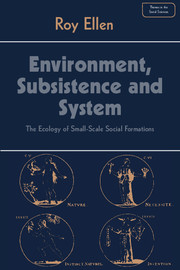Book contents
- Frontmatter
- Contents
- Preface
- Acknowledgements
- 1 ENVIRONMENTAL DETERMINISM AND CAUSAL CORRELATION
- 2 POSSIBILISM AND LIMITING FACTORS
- 3 CULTURAL ECOLOGY AND THE EXPLANATORY IMPERATIVE
- 4 HUMAN ECOLOGY AND THE BIOLOGICAL MODEL
- 5 THE FLOW OF ENERGY AND MATERIALS
- 6 ECOSYSTEMS AND SUBSISTENCE PATTERNS I
- 7 ECOSYSTEMS AND SUBSISTENCE PATTERNS II
- 8 SYSTEMS AND THEIR REGULATION
- 9 INFORMATION AND THE MANIPULATION OF THE ENVIRONMENT
- 10 ADAPTATION: A SUMMARY AND RECONSIDERATION
- 11 THE REPRODUCTION AND EVOLUTION OF SOCIAL AND ECOLOGICAL SYSTEMS
- 12 ECOLOGY IN ANTHROPOLOGICAL METHOD AND THEORY
- Notes
- Bibliography
- Name Index
- Subject Index
1 - ENVIRONMENTAL DETERMINISM AND CAUSAL CORRELATION
Published online by Cambridge University Press: 05 June 2012
- Frontmatter
- Contents
- Preface
- Acknowledgements
- 1 ENVIRONMENTAL DETERMINISM AND CAUSAL CORRELATION
- 2 POSSIBILISM AND LIMITING FACTORS
- 3 CULTURAL ECOLOGY AND THE EXPLANATORY IMPERATIVE
- 4 HUMAN ECOLOGY AND THE BIOLOGICAL MODEL
- 5 THE FLOW OF ENERGY AND MATERIALS
- 6 ECOSYSTEMS AND SUBSISTENCE PATTERNS I
- 7 ECOSYSTEMS AND SUBSISTENCE PATTERNS II
- 8 SYSTEMS AND THEIR REGULATION
- 9 INFORMATION AND THE MANIPULATION OF THE ENVIRONMENT
- 10 ADAPTATION: A SUMMARY AND RECONSIDERATION
- 11 THE REPRODUCTION AND EVOLUTION OF SOCIAL AND ECOLOGICAL SYSTEMS
- 12 ECOLOGY IN ANTHROPOLOGICAL METHOD AND THEORY
- Notes
- Bibliography
- Name Index
- Subject Index
Summary
Huntington explained the Mongol migrations by the fluctuations in rainfall and barometric pressure in the arid zones of central Asia. Brooks carried on the good work by basing a graph of rainfall in central Asia on the migrations of the Mongols! The first extrapolated from the barometer to the Mongols, and the second, with even less justification, from the Mongols to the barometer. What better example of a serpent biting its own tail?
Emmanuel le Roy Ladurie 1972:17ENVIRONMENTALISM
Ecology could no more have existed as a science in the early nineteenth century than could biology one hundred years earlier (Foucault 1970: 125–65). Although both had precursors (geography on the one hand, and natural history on the other), the material and intellectual conditions just did not exist. While the ideas associated with this shift (those we associate with Charles Darwin and Ernst Haeckel) have been very important in shaping the development of ecological studies in anthropology, the investigation of man–environment relations in general has a far longer history. It has been subject to a wide spectrum of influences, principally emanating from the philosophies of evolutionism (in its widest sense), materialism and environmentalism. Although these labels are by no means mutually exclusive, I am here principally concerned with the last of them.
The term ‘environmentalism’ is generally applied to explanatory schemes which maintain that human social and cultural behaviour is to a large extent determined, in a mechanistic fashion, by the natural habitat.
- Type
- Chapter
- Information
- Environment, Subsistence and SystemThe Ecology of Small-Scale Social Formations, pp. 1 - 20Publisher: Cambridge University PressPrint publication year: 1982

